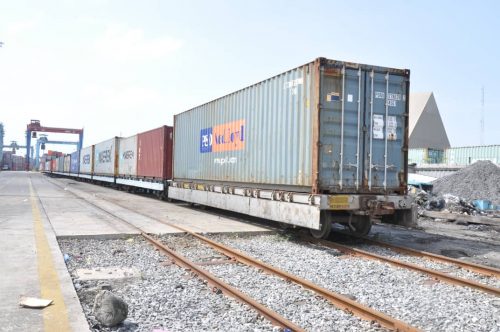The resumption of evacuation of containers out of Apapa Port by rail is once again a reality. Thanks to APM Terminals, Nigeria’s biggest container terminal operator, and the Nigeria Railway Corporation (NRC). The restoration of the rail service was firmed up last week, and it came at a most auspicious time, a very critical time when movement of cargoes out of the Lagos ports has become almost a nightmare to both the port operator and port users.
Rail service at Apapa Port is not new. The port, which is Nigeria’s premier port, was designed and constructed with rail services from inception. In pre-independence and post-independence Nigeria, imported goods were moved out of the ports by rail while export commodities, mainly agricultural products from the hinterlands were brought to the port by rail and inland waterways.
Unfortunately, like other critical infrastructures, rail transport gradually suffered decay and eventually collapsed due to neglect by successive administrations in the country, especially during the long years of military interregnums. At the port, relics of the railway lines could be seen as a sad reminder of a one-time functional railway service. But in 2013, few years after taking over the Apapa container terminal, APM Terminals took a bold step to resuscitate the rail service by reconstructing the rail line at the port and linking it to the national line. The idea was to enhance cargo movement operations and to provide an alternative mode of cargo evacuation to customers. The rail service was operating three times per week moving containers from the port to Kano and Kaduna.
However, the service suffered some set back due to the inability of Nigerian Railway Corporation to run it effectively. Recently, the two organizations came together to tie the loose ends and resolve the challenges that hampered the smooth operation of the rail service. Both agreed on a standard operating procedure that will ensure effective communication and continuity. Under the new arrangement, containers will be discharged at Alagomeji terminal in Yaba, Lagos and Ijoko Terminal in Ogun State. Trucks would then be deployed to both locations to collect the containers and return empties, which the NRC will convey back to the port.
We commend the two organizations for working out a binding, workable and lasting arrangement. One of the benefits of the standard operating procedure signed by both organisations is that it will bridge the communication gap between the two parties. We join the port community in applauding the new initiative and the restoration of rail service at the Apapa port, especially as it is coming at a time when poor road infrastructure has bogged down cargo evacuation at the port.
Obviously, evacuation of containers by rail will reduce costs and help to ensure faster removal of more cargoes out of the port. In particular, it will enhance the movement of export products, which have in recent times suffered long delays on the road for lack of access into the port as a result of endless traffic gridlock. Return of empty containers, which had been a nagging issue and a major cause of traffic gridlock on the access roads to the port, will also gradually become a thing of the past. With the recent closure of a section of the Apapa Bridge for repair works, the resumption of rail services will help reduce the backlog of containers waiting at the port.
Moreover, the rail operation will complement the ongoing evacuation of containers by barges, and this will reduce significantly the huge number of trucks that come to the port either to evacuate imported cargoes or bring in empty containers or export products.
According to the Lagos District Manager of NRC, a train has 19 wagons and each of the wagons could take 19 units of 40ft or 38 units of 20ft containers. With increased frequency of operations, more trucks will be kept off the roads, and this will further improve when the standard gauge is eventually adopted.
Apart from achieving greater operational efficiency, the present initiative will also enhance efforts aimed at entrenching multimodal transportation of goods in the country.
Indeed one cannot continue to enumerate the gains that will accrue from this laudable venture, as the advantages of rail transportation of cargoes over other modes of transport are well-established. Once again, we say bravo to APM Terminals and the Nigeria Railway Corporation for making this happen.
Copyright Ships & Ports Ltd. Permission to use quotations from this article is granted subject to appropriate credit given to www.shipsandports.com.ng as the source.

